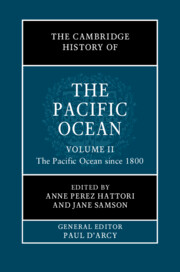Book contents
- The Cambridge History of the Pacific Ocean
- The Cambridge History of the Pacific Ocean
- The Cambridge History of the Pacific Ocean
- Copyright page
- Contents
- Figures
- Tables
- Contributors to Volume II
- Frontispiece
- General Editor’s Introduction
- Preface to Volume II
- Part VII Rethinking the Pacific
- Part VIII Approaches, Sources, and Subaltern Histories of the Modern Pacific
- 37 Archives and Community Memory in the Pacific
- 38 Missing in Action
- 39 Rethinking Gender and Identity in Asia and the Pacific
- 40 Fifty Years of The Hawaiian Nation
- 41 Pacific Literature and History
- 42 Film and Pacific History
- 43 The Visual and Performing Arts of the Pacific
- Part IX Culture Contact and the Impact of Pre-colonial European Influences
- Part X The Colonial Era in the Pacific
- Part XI The Pacific Century?
- Part XII Pacific Futures
- References to Volume II
- Index
38 - Missing in Action
Women’s Under-representation and Decolonizing the Archival Experience
from Part VIII - Approaches, Sources, and Subaltern Histories of the Modern Pacific
Published online by Cambridge University Press: 11 November 2022
- The Cambridge History of the Pacific Ocean
- The Cambridge History of the Pacific Ocean
- The Cambridge History of the Pacific Ocean
- Copyright page
- Contents
- Figures
- Tables
- Contributors to Volume II
- Frontispiece
- General Editor’s Introduction
- Preface to Volume II
- Part VII Rethinking the Pacific
- Part VIII Approaches, Sources, and Subaltern Histories of the Modern Pacific
- 37 Archives and Community Memory in the Pacific
- 38 Missing in Action
- 39 Rethinking Gender and Identity in Asia and the Pacific
- 40 Fifty Years of The Hawaiian Nation
- 41 Pacific Literature and History
- 42 Film and Pacific History
- 43 The Visual and Performing Arts of the Pacific
- Part IX Culture Contact and the Impact of Pre-colonial European Influences
- Part X The Colonial Era in the Pacific
- Part XI The Pacific Century?
- Part XII Pacific Futures
- References to Volume II
- Index
Summary
The archival record, in all its forms, plays a significant role in the documentation of histories, peoples, and events. In the Pacific region, archival collections typically reflect their respective colonizers’ interests, are written in colonial languages, and are confined in different and far-flung collections. Furthermore, underlying these archives lies a complex variety of gender issues. Hence, this chapter considers the broad archival record in Oceania as a body of privileged knowledge embedded within the deep material cultures of the Islands and oftentimes strongly evoking emotions and memory. It seeks to privilege women’s experience and voices to generate meaningful discussions. As Natalie Harkin eloquently expresses of Australian Aboriginal archives,
Our family archives are like maps that haunt and guide us toward paths past-travelled and directions unknown. We travel through these archives that offer up new stories and collections of data, and a brutal surveillance is exposed at the hands of the State. We gain insight into intimate conversations, letters, behaviours and movements, juxtaposed with categorisations of people, places, landscapes and objects. These records are our memories and lives; material, visceral, flesh and blood.1
- Type
- Chapter
- Information
- The Cambridge History of the Pacific Ocean , pp. 191 - 205Publisher: Cambridge University PressPrint publication year: 2023



